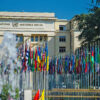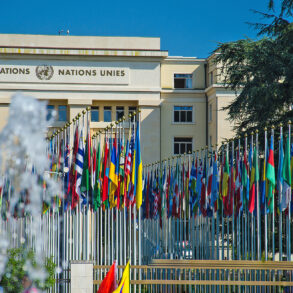Russian propaganda these months proclaims that its army is supposedly fighting the forces of darkness. A grey zone is emerging in Eastern Europe, lawless districts with all the signs of terrible war crimes. There is a war going on, not somewhere, but in our immediate neighbourhood. The horror in Ukraine cannot be suppressed, the images of the victims accompany us, whether consciously or unconsciously.
Even in the holy month of Ramadan, one cannot completely escape the impression of the events. Islamic practice does not displace preoccupation with the bleak state of the world, and Muslims gain their confidence from the hope of a good fate. The authentic practice of faith proves to be sustaining in times of personal or collective crisis.
It is no coincidence that the polymath Peter Sloterdijk dedicates his latest book, an unusual colour theory, to the colour grey. The philosopher transfers Cézanne’s sentence “As long as one has not painted a grey, one is not a painter” into the world of thought. In his multifaceted treatise, Sloterdijk recalls the qualities of darkness, fog, storms and describes the whirlpools of doubt, the experiences of remoteness from God, the desolation of nihilism, the phenomena that occupied many writers and philosophers throughout their lives.
His treatise concludes with the sentence: “whoever has not yet thought grey has not yet encountered the question ‘unde bonum, whence the good?’ which forms the heart of the question of being.” Consciously dealing with the grey, with the grey areas of this earth that we find always and everywhere, prepares us at the same time for the intense appearance of other colours of the spectrum. The view of life never consists only of abysmal experiences and the impressions of grey everydayness.
In his famous Theory of Colours, Goethe attributed superordinate qualities to the hues: Blue, for example, he associated with understanding, yellow with reason, green with sensuality and red with imagination. The use of colours is not only one of the oldest forms of healing treatment, the longing for the marriage of light ultimately explains our desire to travel to the south. The influence of grey tones, whether we like it or not, is always reflected in our moods. Their effect can be triggered by the outside world, but also within us. “A cheerful day is like a grey one when we look at it unmoved,” we read in Wilhelm Meister about the ongoing threat of loss of sensuality. “The desert grows: woe to him who harbours deserts,” Nietzsche says.
The reverse conclusion, which follows from Goethe’s theorem, holds true: we are able, with the help of our inner strength, to turn grey days around and gain brightness from them. Those who engage with shades of grey instead of suppressing them are already in expectation, in openness, for the arrival of other, complementary colours from the spectrum. “The world is wonderful as a whole,” the writer Ernst Jünger once commented, describing a state that tries – unimpressed by catastrophes and abysses – to remain positive. “The light and the darkness represent equally original principles that are at odds with each other like kings of neighbouring kingdoms,” writes Sloterdijk.
Since the outbreak of the war, German civil society has gone into a kind of shock paralysis. A few weeks ago, it was climate protection and the fight against the pandemic that dominated the debates. The achievements of good technology, renewable energies and the new vaccination techniques, were supposed to bring solutions to a humanity in crisis mode.
Now an old trauma from the world of destruction is coming back, the existence of the atomic bomb. The fear of the nuclear inferno is the natural limit of solidarity with the oppressed Ukraine. The country’s arms build-up, more and more money for weapons and war technology, many fear, could lead the Western world into the third world war.
The creeping transition from defensive to offensive weapons with which the government in Kiev is being supplied worries some observers. At present, politicians are overbidding each other, without going into their risk assessments, with demands for the Ukrainian army to be equipped quickly.
It would be fatal if these fundamental questions were not discussed in detail. Hilmar Klute, for example, called for a more intensive, open debate in an article in the Süddeutsche Zeitung: “It was good that the Greens once argued about war missions. And it is frightening how they and their milieu no longer do it. When will people in this country start arguing in all directions again?”
Discussions about the possibility of nuclear war remind us of forgotten philosophers whose thinking, under the impact of the use of the bomb in Hiroshima. Günther Anders saw in the existence of the weapon a “self-expression” of humanity. “The human dream of omnipotence is fulfilled negatively: We possess the power to put an end to the world and have become the masters of the apocalypse.” Anders understood it as the task of our epoch to give humans sovereignty over the machine and to avert impending nuclear and technologically induced ecological catastrophes. “For if I am a conservative, it is solely because it is not enough today to change the world, let alone interpret it. Because we must first and foremost preserve it. In this sense, I am, we are the opponents of nuclear armament and nuclear reactors, conservatives. So, in the sense of conservator.”
The scepticism of post-war German philosophy towards technology, culminated at that time in a clear no to the use of civilian nuclear power and the maintenance of nuclear weapons. For many years, the movement against nuclear armament was rooted in civil society and religious communities.
In fact, for believers, whatever their denomination, the possibility of the use of this weapon and the projections of the destruction of the world by man, is a tremendous provocation. The ruthless logic of military escalation endangers the meaning of the creation story. Here, there is still a lack of corresponding contributions from the camp of Muslims. What is certain is that the concern for the future and the preservation of creation opens the possibility of a dialogue between believers like hardly any other question. If this commitment fails to materialise, the irrelevance of the religions and their speechlessness in decisive situations would be proven once again.
The philosopher Karl Jaspers, who dedicated an entire book to the problem of the atomic bomb, described the preconditions of new solidarity: “Today we are looking for the ground on which people from all faiths can meaningfully encounter each other across the world, ready to reappropriate, purify and transform their own history, but not to abandon it.” In his book, the thinker did not rely on prophets. “Perhaps prophets could bring salvation if they were able to captivate and convince the highest people and the masses alike by example and by the power of faith and the call to repentance. They would raise their cry, which would bring about that conversion without which man seems lost today. But they are not there and would be untrustworthy today.”
Is our legal order being defended in Ukraine and what risks are we prepared to accept? Is there such a thing as an obligation to unconditional solidarity? Jaspers dealt intensively with the well-known dilemma, the relationship between freedom and survival: “For without freedom, survival loses its meaning and without survival, freedom loses its basis. And so the answer can only be: none without the other; but it depends on the chance of peoples and individuals for freedom – and this remains connected with the risk of annihilation.”
The burden of responsibility of decision-makers weighs heavily. The prudence of a Chancellor who approaches these issues with caution and circumspection is quickly dismissed by an impatient public as a hesitant attitude. The reintroduction of the all-defining friend-foe distinction in the political, jeopardises the chances of diplomacy to find a way out.
Dealing with the grey areas, the nihilism of destructive weapons and the depressive moods they cause in us is not pointless. The threat of total annihilation is not only understood by philosophers as a rejection of the meaning of existence. Passive resignation will endanger man’s spiritual immune system. According to Jasper, the possibility of final destruction challenges our whole inner reality. Here lies the point of contact with religious practice. The grey and the horror, both phenomena are positively overcome only with spiritual power. Thus we are left with the prospect that Nizami summed up thus: “Every dark night has a bright end.”











